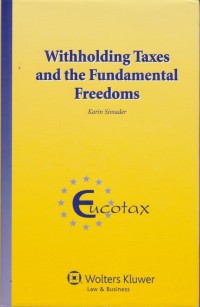
Book
Withholding Taxes and the Fundamental Freedoms
This publication has received the following awards:
• “Preis des österreichischen Bankenverbandes 2013” awarded by the Austrian Bankers’ Association
• “European Academic Tax Thesis Award 2013” awarded by the European Association of Tax Law Professors
• “Wolfgang Gassner-Wissenschaftspreis 2013” awarded by the Austrian branch of the International Fiscal Association
In many recent judgments the European Court of Justice (ECJ) has tested the withholding tax regimes of Member States against the fundamental freedoms. In this book, the first systematic review of these judgments in the light of other ECJ case law and legal doctrine, the author’s prodigious research has engendered a remarkably complete answer to the question of the extent to which EU Member States are allowed to levy withholding taxes, particularly on payments to non-residents. The book shows how the fundamental freedoms interfere with national tax laws’ withholding tax regimes, and suggests informed and insightful answers to questions not yet clarified by the ECJ. The scope of treatment goes beyond the TFEU to the EEA Agreement, various agreements with Switzerland, and a number of association and partnership agreements with third countries. The focus remains fixed on the instrument of a withholding tax as such, not with individual countries or types of income. Rather, the common features of withholding taxes on any kind of income are highlighted, so practitioners have a guide that can be used definitively across the widest possible range of withholding tax situations. Among the topics and issues dealt with are the following:
• Examination scheme of the ECJ for assessing an infringement of the fundamental freedoms;
• Determination of the applicable freedom(s);
• How the fundamental freedoms affect third countries;
• Timing disadvantages;
• Obligations of the payment debtor;
• Adverse effects on the tax amount;
• Taxation of non-resident income that is tax exempt for residents;
• Comparability of residents and nonresidents with regard to withholding taxes;
• Requirements for a valid justification for discriminatory treatment based on withholding taxes; and
• How neutralization of discriminatory treatment by the residence state works.
Detail Information
| Call Number |
29 WIT kar
|
|---|---|
| Publisher | Wolters Kluwer Law & Business : The Netherlands., 2013 |
| Collation |
xii, 363 24.5cm
|
| Language |
English
|
| Classification |
29 WIT kar
|
| ISBN/ISSN |
978-90-411-4842-1
|
| Edition |
-
|
| Subject(s) |






